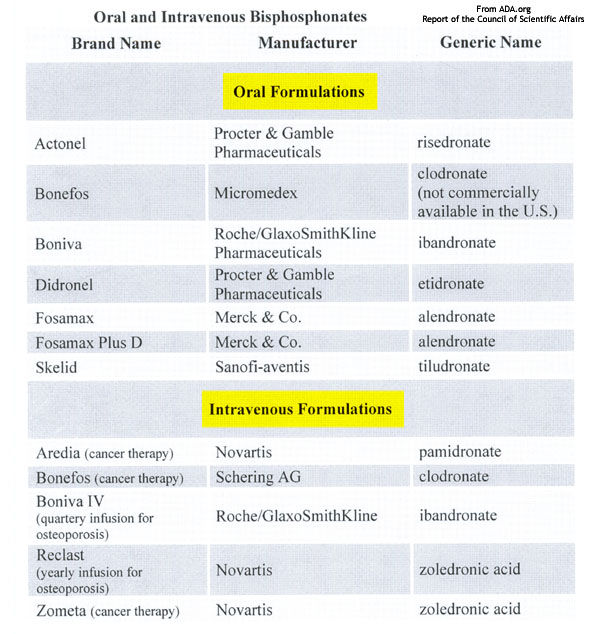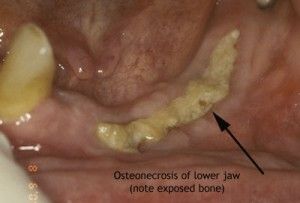This article is a summary of the latest research presented in the Journal of the American Dental Association (JADA)Journal of the American Dental Association (JADA) and a report published by the ADA Council on Scientific Affairs containing recommendations for treatment of dental patients who are taking oral bisphosphonates.
Osteoporosis (os-tee-oh-puh-roh-sis) is a disorder of the skeletal system which severely weakens bones and significantly increases the chance of bone fractures, especially of the hip, spine and wrist. Bone density is decreased by osteoporosis. A person’s bone density is determined by several factors including heredity, hormones, lifestyle, diet, physical activity and certain medications. Also, bone density and bone strength is usually decreased as people age.
Approximately 10 million Americans are affected by osteoporosis, of those, 8 million are women. An additional 34 million are at risk of developing the condition. More women are affected by this disease than cancer, stroke or heart disease combined. Certain prescription drugs called “oral bisphosphonates” (bis-fos-foh-nates) are used to treat these patients including well known brand name medications such as Fosamax, Actonel, and Boniva.[1] The table below lists brand name, manufacturer and generic name for both oral and intravenous bisphosphonates.

Bone fractures as a result of osteoporosis are serious. Fractures of the spinal column and hip can be life-threatening and are the most common problems associated with osteoporosis.[2] An average of 24 percent of patients 50 years and older with hip fractures die within one year of their injury as reported by National Osteoporosis Foundation. The foudation also reports that 1 in 2 women and 1 in 4 men over the age of 50 will have an osteoporosis-related fracture in their lifetime. Of the patients that experience a hip fracture, 1 in 5 will end up in a nursing home and only 15 percent of these patients are able to walk across a room without help six months after. The risk of hip fractures in women is equal to their combined risk of developing breast and ovarian cancers.[1]
Estimates are that bisphosphonates (alendronate) can reduces the risk of hip fractures in patients with osteoporosis by 40 percent. Therefore, this drug could possibly prevent more than 100,000 hip fractures and thousands of deaths each year[3] Obviously, there are risks associated osteoporosis and the benefits of oral bisphosphonate therapy are well documented, patients should never stop taking these medications without thoroughly discussing the benefits and risks with their physician, dentist or Suwanee othodontist.
 Complications of the jaw have been linked to the use of bisphosphonates in the scientific literature.[4-7] These drugs have been associated with the development of osteonecrosis of the jaws (ONJ) which is a serious, but uncommon, condition that causes significant destruction of the jawbones. Osteonecrosis is caused by reduction, obstruction or inhibition of the local blood supply to the bone causing it to die or undergo necrosis. Many patients who take bisphosphonates to treat or prevent osteoporosis have become confused and alarmed by news reports of these associated problems. The majority of reported Bisphosphonate Associated Osteonecrosis (BON) of the jaws cases have occurred in patients with cancer who receive therapy with intravenous bisphosphonates, which absorb differently from oral bisphosphonates. It is important to note, that even though the risk for developing BON remains uncertain, the current scientific literature on cases reported so far, “…a patient’s risk for developing BON is minute with oral bisphosphonate therapy as compared to intravenous bisphosphonate therapy in cancer patients.” [8]
Complications of the jaw have been linked to the use of bisphosphonates in the scientific literature.[4-7] These drugs have been associated with the development of osteonecrosis of the jaws (ONJ) which is a serious, but uncommon, condition that causes significant destruction of the jawbones. Osteonecrosis is caused by reduction, obstruction or inhibition of the local blood supply to the bone causing it to die or undergo necrosis. Many patients who take bisphosphonates to treat or prevent osteoporosis have become confused and alarmed by news reports of these associated problems. The majority of reported Bisphosphonate Associated Osteonecrosis (BON) of the jaws cases have occurred in patients with cancer who receive therapy with intravenous bisphosphonates, which absorb differently from oral bisphosphonates. It is important to note, that even though the risk for developing BON remains uncertain, the current scientific literature on cases reported so far, “…a patient’s risk for developing BON is minute with oral bisphosphonate therapy as compared to intravenous bisphosphonate therapy in cancer patients.” [8]
BON can occur spontaneously, but is more commonly associated with the following medical and dental conditions:
Clinical Appearance And Symptoms Of Osteonecrosis Of The Jaws
You should tell your dentist immediately if you have any of the following symptoms, now or in the months following treatment:
Should I stop taking the oral bisphosphonates?
The benefits of bisphosphonates for the treatment of osteoporosis and its complications are well documented. Research has not shown that stopping use of these drugs will decrease your risk for developing osteonecrosis. You should talk with your physician if you have any questions.
Routine dental treatment should not generally be modified because of the use of oral biphosphonates (Consult your physician and dentist).
Routine dental examinations are a must. Patients who are prescribed oral bisphosphonates and are not receiving regular dental care would likely benefit from a comprehensive oral examination before or early during their bisphosphonate therapy.
All patients taking oral biphosphonates should be informed that:
Orthodontics
Although there are no documented studies examining the effects of bisphosphonates on orthodontic treatment, some case studies have witnessed inhibited tooth movement in patients taking bisphosphonates.[9-10]
Walton Orthodontics
Suwanee, GA

Dr. Walton, our 5-star rated Suwanee, GA, orthodontist specializes in orthodontic care for you or your child with the most advanced types of braces for children, teens, and adults. These types of braces include metal braces, clear braces, Invisalign, Invisalign Teen, Damon braces, In-Ovation braces, braces behind your teeth and short-term braces. Visit our convenient Suwanee orthodontic office serving patients in Suwanee, Cumming, Johns Creek, Alpharetta, Duluth and Milton, GA. Call 770.663.0955 today for your or your child's complimentary, no-obligation consultation for braces or Invisalign today!